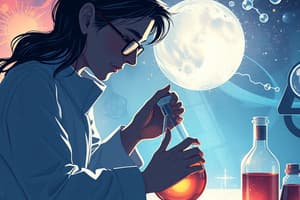Podcast
Questions and Answers
What is a key characteristic of a hypothesis?
What is a key characteristic of a hypothesis?
- It can only have one prediction.
- It is always a true statement.
- It must be testable. (correct)
- It requires no evidence to support it.
In the context of experimentation, what are independent and dependent variables?
In the context of experimentation, what are independent and dependent variables?
- Independent variables are what you change, and dependent variables are what you observe or measure. (correct)
- Independent variables are those that are measured, while dependent variables are those that are changed.
- Both independent and dependent variables are factors that remain constant throughout an experiment.
- Independent variables depend on the outcome, while dependent variables are fixed.
What format do predictions in scientific inquiries often take?
What format do predictions in scientific inquiries often take?
- All predictions must be in the form of percentages.
- Predictions cannot include variables.
- Predictions require supporting data before making a statement.
- Predictions typically follow an 'If...then...' structure. (correct)
Why can a single hypothesis lead to multiple predictions?
Why can a single hypothesis lead to multiple predictions?
Which example best demonstrates the structure of a prediction?
Which example best demonstrates the structure of a prediction?
What is the role of an independent variable in a scientific experiment?
What is the role of an independent variable in a scientific experiment?
Which of the following best describes a hypothesis?
Which of the following best describes a hypothesis?
What does it mean to evaluate good information during research?
What does it mean to evaluate good information during research?
What actions can help broaden your search when looking for information?
What actions can help broaden your search when looking for information?
In the context of scientific experiments, why is it important to isolate and control variables?
In the context of scientific experiments, why is it important to isolate and control variables?
Flashcards are hidden until you start studying
Study Notes
Hypothesis and Predictions
- A hypothesis is a tentative and testable answer to a scientific question, often referred to as "an educated guess."
- Hypotheses can lead to multiple predictions, which are statements that can be tested through experiments.
- Predictions typically follow the structure "If ___ then ___" but are not restricted to this format.
- A good prediction involves an independent variable (the factor changed) and a dependent variable (the factor measured).
- Example: Hypothesis about dog size and food intake leads to a prediction that a larger dog will eat more food when allowed to eat as much as it wants.
Importance of Testable Hypotheses
- A hypothesis must be testable to determine its validity through experimentation.
- Successful experimentation requires clearly defined independent, dependent, and control variables.
- Repeating experiments is crucial for verifying results and ensuring they are not coincidental.
- Consistency can be achieved by conducting trials with multiple subjects or conditions.
Types of Variables
- Independent Variable: The variable that is changed by the scientist, critical for isolating cause-and-effect relationships.
- Dependent Variable: The variable that is observed or measured in response to changes in the independent variable.
- Controlled Variables: Factors held constant to accurately assess the effects of the independent variable.
Designing Experiments
- Experimental procedures should be detailed enough for others to replicate the study.
- Comparison between experimental groups (which include the independent variable) and control groups (which do not) helps establish causal relationships.
- Data collection methods, including notebooks or spreadsheets, allow for organized recording of observations.
Data Analysis
- Analyzing data may involve calculating averages, percentages, or other statistical measures.
- Ensure that all units of measurement are consistent in calculations.
- Graphs are effective for visually displaying results, with the independent variable on the x-axis and the dependent variable on the y-axis.
- Common types of graphs include bar graphs for comparisons and line graphs for time-series data.
General Research Strategies
- To gather information, use encyclopedias, periodicals, and online databases.
- Broaden or narrow searches by adding or subtracting keywords.
- Evaluate the quality of information sources to ensure accuracy and reliability.
Studying That Suits You
Use AI to generate personalized quizzes and flashcards to suit your learning preferences.




